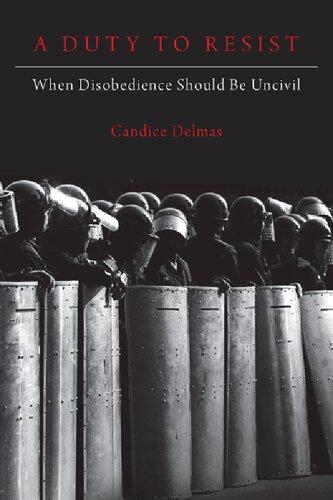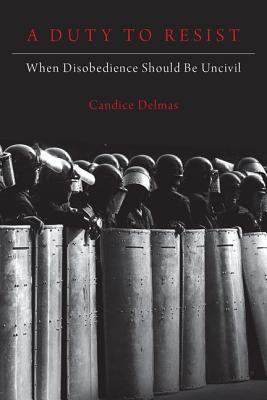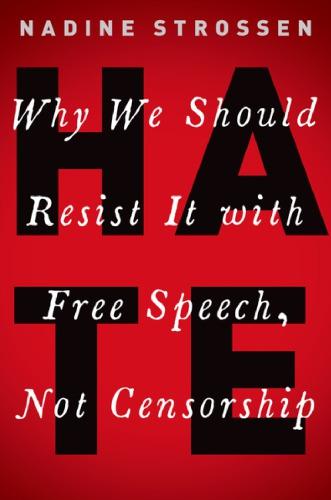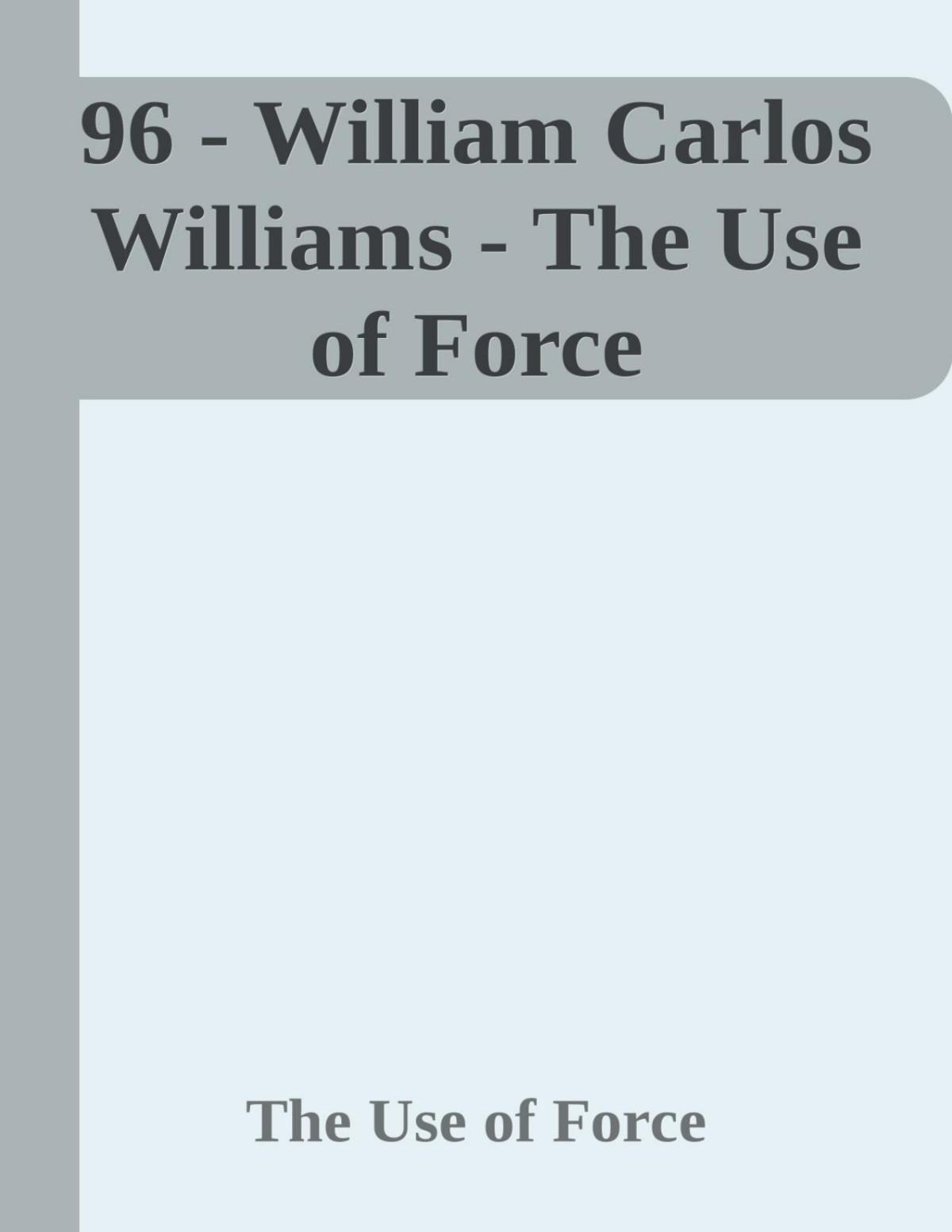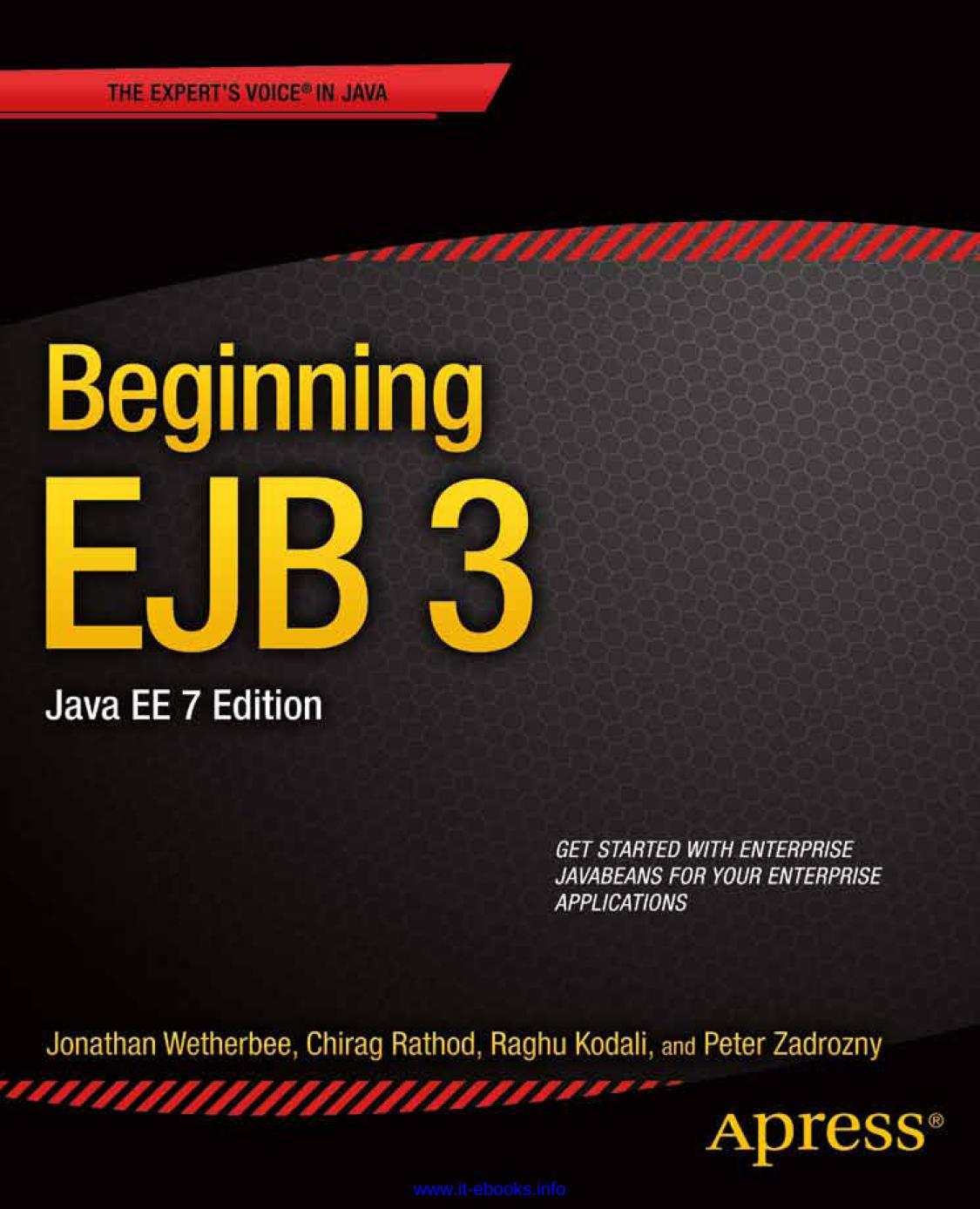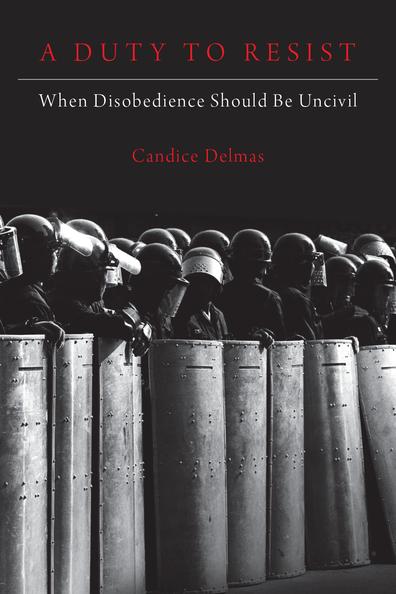A DUTY TO RESIST
When Disobedience Should Be Uncivil
Candice Delmas
Oxford University Press is a department of the University of Oxford. It furthers the University’s objective of excellence in research, scholarship, and education by publishing worldwide. Oxford is a registered trade mark of Oxford University Press in the UK and certain other countries.
Published in the United States of America by Oxford University Press 198 Madison Avenue, New York, NY 10016, United States of America.
© Oxford University Press 2018
All rights reserved. No part of this publication may be reproduced, stored in a retrieval system, or transmitted, in any form or by any means, without the prior permission in writing of Oxford University Press, or as expressly permitted by law, by license, or under terms agreed with the appropriate reproduction rights organization. Inquiries concerning reproduction outside the scope of the above should be sent to the Rights Department, Oxford University Press, at the address above.
You must not circulate this work in any other form and you must impose this same condition on any acquirer.
Library of Congress Cataloging-in-Publication Data
Names: Delmas, Candice, author.
Title: A duty to resist : when disobedience should be uncivil / Candice Delmas.
Description: New York : Oxford University Press, 2018. | Includes bibliographical references and index.
Identifiers: LCCN 2018000829 (print) | LCCN 2018016706 (ebook) | ISBN 9780190872229 (online course) | ISBN 9780190872205 (updf) | ISBN 9780190872212 (epub) | ISBN 9780190872199 (alk. paper)
Subjects: LCSH: Direct action. | Civil disobedience. | Government, Resistance to.
Classification: LCC JC328.3 (ebook) | LCC JC328.3.D436 2018 (print) | DDC 303.6/1—dc23
LC record available at https://lccn.loc.gov/2018000829
1 3 5 7 9 8 6 4 2
Printed by Sheridan Books, Inc., United States of America
ACKNOWLEDGMENTS
This book would not have seen the light of day without David Lyons, my graduate advisor and friend. In a little-read article on Henry David Thoreau, “Political Responsibility and Resistance to Civil Government,” David deplored philosophers’ neglect of “the idea that political responsibility can include a duty to disobey” and defended this duty on the basis of two common arguments for political obligation. His engagement with the subject was brief, just two pages, but they influenced my own intellectual focus. I cherish the time I spent studying with David. His generosity and passion for social justice inspire me.
I thank my colleagues at Northeastern University for their feedback, support, and congeniality. I have the pleasure of working there with members of the Philosophy and Religion and Political Science Departments, and gained much from these interdisciplinary interactions. I wrote large portions of the book while a DworkinBalzan Fellow at the New York University (NYU) School of Law’s Center for Law and Philosophy in 2016–2017. I am grateful to NYU Law and the Balzan Prize Foundation for their generous support. I thank Liam Murphy, Samuel Scheffler, Jeremy Waldron, Moshe
Halbertal, and Katharina Stevens for their kindness and stimulating conversations. I am most indebted to Daniel Viehoff for his constructive feedback.
The book revisits material initially published elsewhere: “Disobedience, Civil and Otherwise,” Criminal Law and Philosophy 11, 1 (2017): 195–211; “Civil Disobedience,” Philosophy Compass 11, 1 (2016): 681–691; “Political Resistance for Hedgehogs,” in The Legacy of Ronald Dworkin, ed. Will Waluchow and Stefan Sciaraffa (Oxford: Oxford University Press, 2016), 25–48; “False Convictions and True Conscience,” Oxford Journal of Legal Studies 35, 2 (2015): 403–425; “Samaritanism and Civil Disobedience,” Res Publica 20, 3 (2014): 295–313 (Springer); and “Political Resistance: A Matter of Fairness,” Law and Philosophy 33, 4 (2014): 465–488. I am grateful to Wiley, Springer, and Oxford University Press for permission to use parts of this material.
I thank the organizers and attendants of NYU Law’s Global Fellows Forum, the University of Richmond’s Political Philosophy Learning Community, and the American Society for Political and Legal Philosophy Conference at the APSA meeting in San Fransisco, for their constructive critical engagement with my arguments. For comments on individual chapters and sections, I thank Sean Aas, Guy Aitchison, Amna Akbar, Juliet Hooker, Robert Jubb, David Lyons, Gabriel O’Malley, Avia Pasternak, and Amélie Rorty. I am most indebted to William Smith and Robin Celikates for their helpful reviews of the book and support for my project. I also wish to thank the third, anonymous reviewer for detailed feedback. I am grateful to Kimberley Brownlee, whose work I have long admired, for her mentorship. Thanks to Samantha Hirshland for her research assistance and to Isaac Shur for indexing the book. To Simon Waxman I owe
sharper arguments and better flow. I am grateful to Lucy Randall at Oxford University Press for her editorial work.
Thanks to my family in France—my parents, Stéphane and Chantal Delmas, and my brother Gregory—and my friends in Boston (especially Helena de Bres) for their love and support. Thanks to Rose Mwobobia for giving me the peace of mind I needed to write the book. I dedicate it to the loves of my life: Gabriel, Marcel, and Augustin.
Political Obligation(s)
RI d I ng F o R FR eedom
The attacks started when the riders reached the bus depot in Rock Hill, South Carolina. There were thirteen of them, seven Black men and six White. They had set out from Washington, DC, a few days earlier—May 4, 1961—on their way to New Orleans. There was no special reason for their visit to Rock Hill. They had just stopped to stretch their legs, use the restroom, and get off the road for a few minutes.
But at the Greyhound station, twenty White men, some of them members of the Ku Klux Klan (KKK), were waiting for the group. The bus riders were not some anonymous thirteen. They were Freedom Riders, dispatched by the Congress of Racial Equality (CORE) to break the laws of the American South. CORE had organized its first freedom ride, known as the Journey of Reconciliation, fourteen years earlier, after the U.S. Supreme Court ruled in Irene Morgan v. Commonwealth of Virginia (1946) that racial segregation was prohibited in commercial interstate travel. But southern authorities
ignored the Court and continued to uphold decades-old Jim Crow ordinances denying Blacks equal rights on the highways.
That meant integrated buses themselves could be banned from the roads, and bus stations could bar Blacks from their waiting rooms. When the Freedom Riders arrived in Rock Hill, they found a mob with enforcement on its mind. It was there that a young KKK member, Elwin Wilson, famously and savagely beat John Lewis, a Black man who, like the other Freedom Riders, was thoroughly trained in and committed to nonviolence. Many years later, Wilson would publicly repudiate his actions and apologize to Lewis, who had become a senior member of the U.S. Congress and a highly respected elder statesman of the civil rights movement. But that was a long way off. In 1961, the air was so thick with anti-Black violence that Martin Luther King Jr., who had drawn national attention by leading the 1955–1956 Montgomery bus boycott, refused to support the Freedom Rides. The activists would “not make it to Alabama,” he warned.
In spite of King’s well-earned pessimism, the Freedom Riders and their two buses, one Greyhound and one Trailways, did make it to Alabama. Just outside Anniston, a small city in the northeast of the state, a group of Klansmen pelted the arriving Greyhound with rocks and slashed its tires. After forcing the driver to stop, the Klansmen firebombed the bus. As it burned, they held the doors shut to ensure that no one could get out. For reasons that are not clear, the mob eventually retreated, and the gasping riders escaped—only to be assaulted on the side of the road. In town, another group of Klansmen boarded the Trailways bus and beat the Freedom Riders nearly to the point of unconsciousness.
Bloodied but undaunted, the Freedom Riders continued to Birmingham, where a large crowd waited with baseball bats, iron pipes, and bicycle chains. Police Commissioner Bull Connor and his men participated in the assault. Jim Peck, White and a veteran of the
Journey of Reconciliation, was beaten so badly that his head wounds alone required fifty-three stitches. The first hospital Peck was taken to refused to provide him with treatment. He nearly died on his way to another.
Hearing of the violence, U.S. Attorney General Robert Kennedy dispatched the National Guard to escort the Freedom Riders safely to Montgomery. But by then, the bus drivers refused to go on. Determined to make it to New Orleans for a planned rally, the Freedom Riders decided to continue by air. Their first flight was canceled due to a bomb threat. Meanwhile, sensing the momentum of the movement, the Student Nonviolent Coordinating Committee (SNCC) organized a new set of riders to travel from Nashville to Birmingham. Connor arrested the activists as soon as they arrived and placed them in jail under “protective custody.”
On May 20, all of the Freedom Riders headed to Montgomery, where they were met by yet another mob. Journalists, too, were waiting, and the attack was nationally televised, shocking the public. The journey continued to Jackson, Mississippi, where police arrested nearly a hundred protesters for violating a recently passed breach-ofthe-peace statute. After the protesters refused to pay fines of two hundred dollars each, a judge sentenced them to ninety days in jail, where they were beaten and half-starved. By the end of the summer, over three hundred activists were incarcerated in the state penitentiary.
Though the Freedom Riders never reached their stated goal of New Orleans, their movement attracted national and international attention. Attorney General Kennedy petitioned the Interstate Commerce Commission to enforce the Supreme Court’s ruling. The commission did so, effectively integrating interstate travel on November 1, 1961. By engaging in peaceful, nonviolent, public disobedience (disobedience of local law anyway), the Freedom Riders helped to persuade the government, and at least some portions of the public, of the Jim Crow system’s brutality and injustice. They
demonstrated the need for change and to enforce federal law. They and likeminded activists inspired many more people to join the struggle for civil rights.
The Freedom Rides, like the iconic lunch counter sit-ins before them, depended on the courage of citizens engaged in civil disobedience. Those who flouted the law risked life and liberty. They met police and civilian terrorism with nonviolence. They stood before vindictive courts with peaceful resolve. But too much bravery can be hazardous. The example of the Freedom Riders also suggests that civil disobedience and other forms of principled lawbreaking are supererogatory, the work of heroes rather than ordinary people and therefore beyond moral requirement. Who among us is willing to confront armed Klansmen, let alone refuse to defend ourselves from their blows? Thus a journalist grappled with these questions when he asked one of the White Freedom Riders why he felt it was his responsibility to take part. “I don’t think it’s just my responsibility,” the young man answered. “I think it’s every American’s responsibility. I just think that some people are more conscious of their responsibilities than others.”1
But is there any such responsibility? For the most part, philosophers have not entertained such responsibility. Those concerned with the rights and duties of citizens generally believe that there is a moral duty to obey the law because it is the law, although they tend to doubt that a satisfying account of this duty can be offered and often attach a string of qualifications to their defense.2 Those who criticize the duty to obey the law—chiefly among them philosophical anarchists—have not discussed alternative duties that might bind citizens. Even proponents of civil disobedience generally hold that breaking the law is presumptively wrong and only conceive of it in terms of permission, not duty. Finally, feminist philosophers, who have extensively studied the responsibility to resist oppression, have not systematically addressed principled disobedience.
In this book, I defend the existence of moral duties to resist injustice, including through principled—civil and even uncivil— disobedience. Resistance to injustice is, I will argue, our political obligation. Traditionally, theorists hold that political obligation is a matter of obedience: our duty is to follow the law, especially in democratic states, assumed to be nearly just and legitimate. Breaches are accepted only when injustice is intolerable or disobedience is very narrowly constrained, or both. But I will show that the opposite is true—that principled lawbreaking, civil or uncivil, is not only acceptable under most real-world conditions, including those of democratic, nearly just, legitimate states, but that it can also be morally required for people living under these conditions. Hence, this book aims to: (1) think beyond civil disobedience to uncivil forms of principled disobedience, (2) apply defenses of civil disobedience to justify uncivil disobedience, (3) use arguments for the duty to obey to defend duties to disobey, and (4) extend the concept of political obligation to include these duties.
A dut Y to R es I st
Faced with injustice, activists have long recognized resistance to injustice, including through disobedience, as more-than-optional.
Henry David Thoreau considered resistance to illegitimate governments a moral duty. His 1848 essay “Resistance to Civil Government,” posthumously titled “On the Duty of Civil Disobedience” and now widely known as “Civil Disobedience” (Thoreau himself did not speak of “civil disobedience,” although he is commonly credited with coining the term), urged citizens to withdraw their support from the government of the United States, given its support of slavery, the war against Mexico, and the atrocious treatment of Native Americans. Thoreau advocated conscientious
refusal to pay the Massachusetts poll tax as one practical means of noncooperation.3
Inspired by Thoreau, Mohandas K. Gandhi, too, considered noncooperation with unjust governments a citizen’s moral duty. “Every citizen silently but nevertheless surely sustains the government of the day in ways of which he has no knowledge,” Gandhi wrote. “And it is quite proper to support it so long as the actions of the government are bearable. But when they hurt him or his nation, it becomes his duty to withdraw his support.”4
King, indebted to both Thoreau and Gandhi, argued in his “Letter from Birmingham City Jail” that “one has not only a legal but a moral responsibility to obey just laws. Conversely, one has a moral responsibility to disobey unjust laws.”5 In a lesser-known speech at the eve of the 1955–1956 Montgomery bus boycott, King told his audience: “Not only do we have a right to be free, we have a duty to be free. So when you sit down on a bus, when you sit down in the front, or you sit down by a White person, you are sitting down because you have a duty to sit down not merely because you have a right.”6
Contemporary activists embrace this duty-centered discourse, too. In Indignez-vous!, former member of French Resistance and concentration camp survivor Stéphane Hessel calls for peaceful insurrection against growing socioeconomic inequalities, the corruption of democracy under financial capitalism, the treatment of sans-papiers (undocumented migrants), and Israel’s occupation of Palestine.7 The book became the manifesto for Occupy and Indignados, the antiausterity social movements that agitated the United States, Spain, and other Western states after the 2008 financial crisis and especially in the early 2010s. Belgian and French human rights organizations, including Ligue des droits de l’Homme and Collectif contre les expulsions, have defended a moral “duty of solidarity,” urging people to disobey laws that prohibit the provision of shelter and assistance to undocumented immigrants.8 Eric Herrou, a French farmer who is
accused of helping undocumented migrants cross the border from Italy in the Roya Valley, “think[s] it’s [his] duty” to help them.9
Masih Alinejad, founder of the My Stealthy Freedom campaign, which encourages Iranian women to post pictures of themselves without headscarf, in violation of the law, called on non-Muslim women visiting the country to join the fight: “When compulsory hijab affects all women, then all women should raise their voice.”10 Saudi women have filmed themselves driving, in open defiance of the law, and posted the videos on YouTube.11 In June of 2011, one of the drivers, Maha al-Qahtani, told the New York Times, “I woke up today believing with every part of me that this is my right, I woke up believing this is my duty, and I was no longer afraid.”12 In September 2017, Saudi Arabia announced it was ending the ban on women driving; the previously stigmatized, defiant women drivers are now publicly celebrated.
Edward Snowden, who leaked to the press millions of documents exposing the U.S. National Security Agency (NSA)’s massive and invasive surveillance programs, appealed to his duty to blow the whistle, and affirmed that “every citizen has a duty to resist” unethical and immoral law and “to try to build a better, more fair society.”13
A sense of responsibility to contest injustice permeates the Black Lives Matter (BLM) movement. As BLM cofounder Opal Tometi put it, “We think that everybody, no matter where you are, no matter what your socioeconomic status is, whatever your job is—you have a duty in this moment in history to take action and stand on the side of people who have been oppressed for generations.”14
Thoreau, Gandhi, and King form a kind of holy trinity of civil disobedience—names uttered endlessly and in admiring tones whenever debates over principled lawbreaking arise. As we will see, though, neither their ideas nor their actions fit the standard conception of civil disobedience that philosophers—John Rawls chief among them—began to articulate in response to the civil rights movement.
According to that conception, civil disobedience is a conscientious, public, nonviolent breach of law, undertaken in a near-just state, by agents who demonstrate their sincere endorsement of the system’s legitimacy by accepting punishment, and who seek to persuade the majority to change a law or policy by appealing to widely accepted principles of political morality. Few disobedient actions, today and historically, meet these requirements. And some activists openly flout these for reasons that may nonetheless be worth defending.
Take the English suffragist leader Emmeline Pankhurst, who called for “deeds, not words.” What she had in mind were spectacular, oft illegal actions to force the public to pay attention to the injustice of women’s oppression. “To be militant in some way or other is . . . a moral obligation,” she asserted when supporting women who smashed shop windows, burned golf course grass with acid, and put their bodies on the line through hunger strikes and suicides in pursuit of a more just society. “It is a duty which every woman will owe to her own conscience and self-respect, to other women who are less fortunate than she is herself, and to all those who are to come after her.”15
More recently, the French syndicalist activist and politician José Bové, who articulates a “duty to disobey” environmental and global labor injustice, has taken up decidedly uncivil disobedience.16 After he was convicted of vandalizing a McDonald’s restaurant in Millau in 1999, Bové became a symbol of the alter-globalization and farmersunion movements. He is also the leader of Les Faucheurs Volontaires d’OGM (which could be translated as “The Resolute GMO Reapers”), a group of over six thousand militants who have vowed to destroy genetically modified crops.17
In this book, I take seriously activists’ appeals to moral duties in the face of injustice. I do so by also taking seriously the traditional notion of political obligation—the duty to obey the law in legitimate, nearly just states. On its face, it may seem that I am forcing the proverbial square peg into a round hole, but I shall argue that the
very grounds supporting a duty to obey also impose duties to disobey under conditions of injustice. My argument is based on four grounds: the natural duty of justice (chapter 3), the principle of fairness (chapter 4), the Samaritan duty (chapter 5), and political association (chapter 6).
I have chosen these four grounds because they are well established in ordinary and critical morality. Many philosophers—from Socrates to Rawls—believe one’s sole or main political obligation is to obey the law of basically just, legitimate societies. And while philosophers disagree about what grounds this duty, the four principles upon which I rely represent the main competitors. Because philosophers typically view the duty to obey the law as liable to be outweighed by stronger, countervailing reasons (it is “defeasible”), they agree that civil disobedience may be justified. But they merely show that disobedience is sometimes permissible, not that it is ever obligatory, and they do not devote any attention to the circumstances under which uncivil disobedience might be acceptable.18
For the most part, theorists do not address what citizens may and ought to do in less-than-nearly-just societies, which fail the test of legitimacy, because they generally believe that disobedience in illegitimate states is not particularly problematic and does not need special justification. Thus, much hinges on the diagnosis of political legitimacy: If the state is legitimate, subjects ought to comply with its law and may sometimes disobey it civilly. And if it isn’t, they neither owe the state anything—they have no “political obligation”—nor are they bound to only disobey its law civilly; they may well resort to radical forms of resistance, including, at the extreme, revolution. While this binary view is broadly accepted, accounts of legitimacy (including of how injustice affects it) and diagnoses of particular societies are not. There are deep and intractable disagreements about whether nonideal societies “like ours” (viz., large, industrialized, liberal democratic Western nation-states) qualify as legitimate or not.
Readers will not find an answer to whether such societies are legitimate in this book—I will leave that for others to explore. What they will find is a unified account of political obligation that focuses on duties of resistance under conditions of injustice and applies to all societies, legitimate and illegitimate. This book conceives of resistance as a multidimensional continuum of dissenting acts and practices, which includes lawful and unlawful acts (or “principled disobedience”), and expresses, broadly, an opposition and refusal to conform to the established institutions and norms, including cultural values, social practices, and laws. It shows that resistance to injustice, including through principled disobedience, is sometimes a better avenue to meet the demands of justice, fairness, Samaritanism, and political membership than legal compliance is, and that uncivil acts of disobedience may preserve justice and democracy just as well as civil disobedience. It thus proposes to extend the concept of political obligation to encompass citizens’ political responsibilities, including their moral duties to resist injustice and to engage in principled disobedience under certain circumstances.
My account of political obligations engages with champions of the moral duty to obey the law and philosophical anarchists alike. Whichever of the four grounds one endorses either as the basis of the duty to obey the law or more basically as a valid source of obligations, one is also, wittingly or not, committed to the existence of a duty to resist injustice and disobey unjust laws. Anarchists are right to be suspicious of states’ demand for unquestioning obedience on the part of their subjects and of theorists’ efforts to show that actual societies trigger general duties of compliance. But whereas anarchists reject nonvoluntarily incurred duties, I show that citizens of nonideal societies have numerous, stringent political obligations. Anarchists rarely discuss disobedience, except to say that the absence of political obligation does not have any radical practical implications (this is how John Simmons, for instance, distinguishes philosophical
anarchism from its “bomb-throwing” relative).19 Because of this status-quo embracing tendency, philosophical anarchism strikes me as not only “toothless,” to use Chaim Gans’s epithet, but also condescending in its insistence that what is right is not necessarily what it is right for “the masses” to believe.20 In articulating instead a defense of political obligations to resist injustice, including by way of principled lawbreaking, my account purports to be a radical alternative to philosophical anarchism.
In addition, my account could be seen as either an alternative to or an extension of defenses of the duty to obey the law. On most established accounts (certainly all current ones), the duty to obey is pro tanto—ordinarily decisive yet defeasible—and does not arise in the face of serious injustice. Here, my account answers the question: What happens when the moral duty to obey the law fails to obtain, locally or overall? From this perspective, all champions of political obligation could in principle endorse my account of political obligations as a friendly extension of theirs, as some in fact do.21 However, the duties to resist injustice and disobey the law that I identify may come into conflict with the putative moral duty to obey the law (at least in cases where it is not clear whether the injustice is so severe as to cancel the duty to obey), and champions of the duty to obey and I might disagree over whether the duty to obey should take precedence.
Although my account of political obligations relies on principles commonly used to support the duty to obey the law, I do not argue that all or only such principles ground citizens’ obligations in the face of injustice. Thus I do not see how, say, gratitude and deference, which have been invoked in defense of traditional notions of political obligation, could trigger obligations of resistance under unjust conditions.22 But one might defend political obligations of resistance on the ground of respect for law, which Joseph Raz uses to support a semi-voluntary and particular obligation to obey the law. (William
Scheuerman’s defense of Snowden’s whistleblowing through the lens of respect for the rule of law is a possible illustration of such argument.23) And Carole Pateman and Nancy Hirschmann, who advance forceful feminist critiques of liberal contractual theories of political obligation, entertain the possibility that the demands of democratic consent, well understood, counsel resistance against, instead of acquiescence to, patriarchal government.24 Still other normative principles that philosophers have not used to support the duty to obey the law, such as freedom-as-nondomination (the unifying theme of civic republicanism) and care (the centerpiece of feminist virtue ethics) may well provoke additional responsibilities.
The sources of political obligation on which I focus are not just widely accepted but also have radical and broad-ranging implications under defective sociopolitical conditions. By putting common liberal principles to radical use in this way, I pursue a strategy associated with Carole Pateman, Iris Marion Young, Lisa Schwartzman, Rae Langton, and other feminists and critical race theorists, who show that liberals, by their own lights, should advocate sweeping political change to combat oppression.25
ke Y conce P ts
I use the term injustice broadly, to encompass the overlapping categories of unjust law and agent and structural injustice. Law, the set of authoritative norms and decisions that form a legal system, is unjust, in whole or in part, when it violates substantive or procedural norms of political morality such as due process and respect for everyone as equal. The distinction between agent and structural injustice is useful: agent injustice consists in the direct and deliberate imposition of harms by individuals on other individuals, while structural injustice designates the unintended but unjust outcome of
social processes or structures that are based on morally unacceptable values or belief systems. The unjust outcomes may range from unfair distribution of the burdens and benefits of social cooperation (the focus of chapter 4) to mass human rights violations.
Iris Marion Young uses the concept of structure to denote, broadly, “the rules and resources brought to actions and interactions,” that is, what governs, enables, and constrains social interactions, and, in particular, “the relation of social positions that condition the opportunities and life prospects of the persons located in those positions” or the ways in which different social positions determine individual lives.26 She explains:
Structural injustice exists when social processes put large categories of persons under a systematic threat of domination or deprivation of the means to develop and exercise their capacities, at the same time as these processes enable others to dominate or have a wide range of opportunities for developing and exercising their capacities.27
That is, structural injustice occurs where a problematic system of norms and entitlements hinder the development of some people’s capacities while benefiting others.
The related concept of oppression, which I will use interchangeably with “injustice” in the book, describes the inhibition of human abilities as a result of structural injustice. Marilyn Frye defines oppression as “a network of forces and barriers which are systematically related and which conspire to the immobilization, reduction and molding” of people and people’s lives, on the basis of their membership in a social group.28 The harms of oppression are inflicted though disabling structural constraints, including, as Young argues, exploitation, marginalization, powerlessness, cultural imperialism, and violence.29 These phenomena—and the structures that produce

